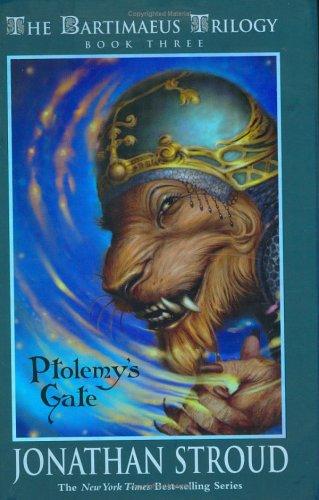lux ⛥ reviewed Ptolemy's Gate by Jonathan Stroud (The Bartimaeus trilogy ;)
Review of "Ptolemy's Gate" on 'Goodreads'
4 stars
The last book in a series always manages to woo me a bit. I may just be a sucker for profound endings, but I don't know. Ptolemy's Gate sure had this same effect on me. I found myself reading wantonly, like I used to do when I was little. The words flew by my eyes so quick, and I barely gave myself time to take notes for the review. Funnily enough, the notes I did take disappeared mysteriously a couple days ago. I'm winging it now that my precious scribbles are lost.
Anyway, back to the book. Ptolemy's Gate is the third and final installment of the Bartimaeus trilogy. It concludes the series nicely, and leaves readers with some interesting surprises. I found the entire series, but this novel especially, very ambitious. It attempts to mingle otherworldly and esoteric concepts such as space-time-continuums with a slew of true historical facts. …
The last book in a series always manages to woo me a bit. I may just be a sucker for profound endings, but I don't know. Ptolemy's Gate sure had this same effect on me. I found myself reading wantonly, like I used to do when I was little. The words flew by my eyes so quick, and I barely gave myself time to take notes for the review. Funnily enough, the notes I did take disappeared mysteriously a couple days ago. I'm winging it now that my precious scribbles are lost.
Anyway, back to the book. Ptolemy's Gate is the third and final installment of the Bartimaeus trilogy. It concludes the series nicely, and leaves readers with some interesting surprises. I found the entire series, but this novel especially, very ambitious. It attempts to mingle otherworldly and esoteric concepts such as space-time-continuums with a slew of true historical facts. All of this is laced with the usual sarcasm and satire of Bartimaeus, the quick-witted protagonist, The comical aspects of the dialogue are hilarious, as fans of the series already know.
Back to the esoteric topics—Jonathan Stroud obviously has an inspired interest in theoretical physics, and possibly the occult. He provides a very interesting description of the Other Place, the non-physical realm of demons and djinn. Here is a description from The Bartimaeus Trilogy Wiki:
The Other Place is a realm of chaos, in which there is no matter but infinite 'essence', which is described as a mass of swirling colours with no borders or boundaries, somewhere between gas and liquid. Time runs at a different rate in the Other Place compared to the human world, although it is not made completely clear in the Bartimaeus Trilogy exactly what relationship between the two timescales is.
What really intrigues me is the so called 'essence.' Being a fan of the esoteric myself, I can only wonder as to what the author is alluding to. Another description offers some more insight:
In the Other Place, all demons are one, and so their collective essence is a single conscious entity. This allows demons to heal from damage sustained in the human world, while also putting the exact mechanics of the Other Place beyond reach of genuine human understanding. Human consciousnesses that visit the Other Place require something to focus their consciousness on and are able to impose their will to a certain degree on the essence of the Other Place, moulding it to specific shapes. Although demons are much better at this than humans, and it does not apparently cause them any harm. However, they prefer not to do it, and appear to actively resent outsiders attempting to impose order upon their realm.
Make of this what you will. I found it highly interesting, and if a chance to interview the author pops up, I will question him about this. In a way, it kind of reminds me of Shamanism and how shamans work with consciousness to connect to the spirit world. While in this world, they consult with 'spirits' for aid in healing and medicinal purposes. Anyway, it's food for thought.
In Ptolemy's Gate, readers began to notice connections between the fact the Bartimaeus frequently takes on the figure of Ptolemy and Kitty's desire to see demons and humans coexisting. Readers become enlightened by the possibility of these two types of entities working together, for the greater good. Bartimaeus talks in awe about a human actually traveling to the Other Place. He explains how the Other Place is where spirits are free and permeable and basically twirl in kaleidoscopic beauty intermingling with forgotten fragments of a dream or bits of some long-lost memory.
Spoiler alert!
The series ended on a slightly surprising note (or not) with the death of Nathaniel. Nathaniel finally opened up and showed his true integrity towards the end of this final book. He saved Bartimaeus and sacrificed himself in the process to save those he loved most. To tell you the truth, it was a bit of a cliffhanger. There were a few loose ends that could have been tied up. I believe the author intended this.


